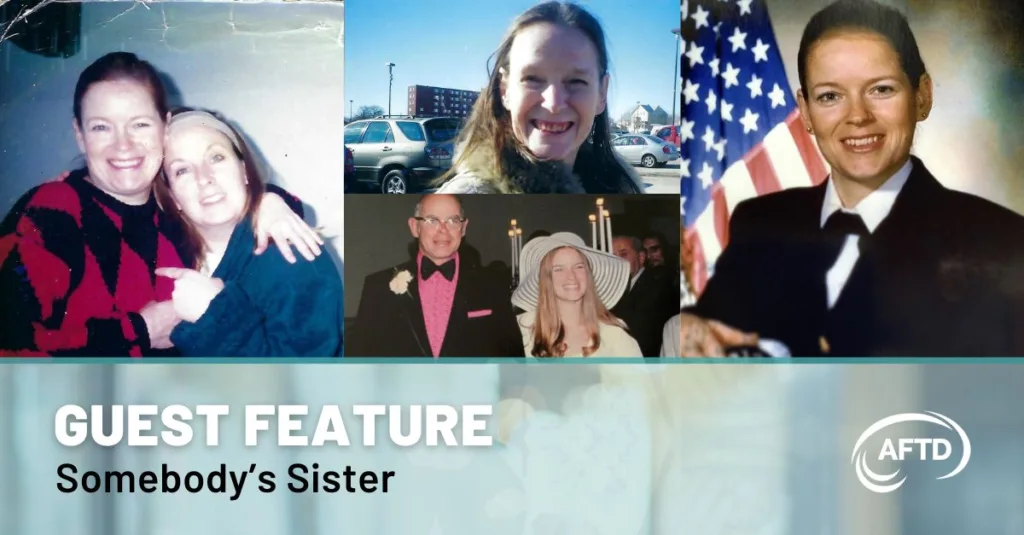Guest Feature: Somebody’s Sister

FTD is an aggressive disease that disrupts people’s lives and relationships, with families often unsure what they are up against at first because it isn’t widely known. As Deborah Dowdell Perry shares in the following essay, finding a community of support can make a world of difference on the grief and pain filled FTD journey.
There were four of us daughters in our family of ten, and while Mom laid dying in the hospital, it was we who sat vigil at her bedside, because that’s what we did. We were the caregivers in our family. We gave, and then gave some more.
But somewhere along the way, things changed, and on an arctic morning in January 2004, my 52-year-old sister Lyndy was found face-down on the bike path in a small suburban coastal town. If not for the lone biker who found her, Lyndy would have died that day.
I got the phone call from South County Hospital at 10 a.m. I was at the kitchen sink, peeling a cucumber, looking out the window at the barren maples. My first thought was, What bill did Lyndy skip out on now? How much does she owe? I hope they take a check…
Because for years, Lyndy’s behavior had been increasingly bizarre. Her downward spiral was so gradual, it is difficult to pinpoint when it started. Lyndy had been a lieutenant in the Navy while a single mother of three sons. She was my partner in our accounting business. But over time, these titles—Lieutenant, Business Partner, Mother—peeled away, and Lyndy became the town’s vagabond. She became homeless, and lived out of an abandoned car. She lost custody of her youngest son, was incarcerated for grand theft auto, and stole food from the grocery store just to stay alive. I’d see her standing on the street corner as I waited for the light to change, always wearing the same tattered clothes, her hair a tangled mess, her gums red and swollen as she smiled and waved to me.
It’s not that we didn’t try. We all tried. My sister Peggy and I, the two youngest daughters, became comrades in arms as we took Lyndy to one doctor after another, retelling the story from the beginning: something is wrong with our sister, and we need help. Peggy took her to the counseling center at the University of Rhode Island. I took her to a psychiatrist a friend recommended, and to a co-worker’s therapist. We both took her to South Shore Mental Health Center.
It’s depression, they said.
It’s not depression, we insisted.
It’s alcoholism, they said.
She hasn’t had a drink in months, we argued.
It wasn’t until that January morning when Lyndy was rushed to the emergency room that we finally found a doctor willing to truly listen. A brain MRI revealed Lyndy had lost a profound amount of her frontal lobe, and she was diagnosed with bvFTD. It felt as if the stars had finally aligned, and we were validated for all we’d been through together over the past several years. It all made sense now.
Although the MRI provided answers, a new quest was just beginning. “Lyndy needs to be cared for properly,” the doctor said. “This is a major undertaking. She’ll need round-the-clock supervision.” I thought, How does one provide round-the-clock supervision to someone who won’t sit still for longer than three minutes? I felt exhausted already.
For five years, Lyndy lived in a facility whose other residents were decades older than she. And for five years, Peggy and I took turns driving the hour-long trip on weekends to visit her. We were her connection to the outside world, bringing her home for family gatherings and taking her for long walks around the neighborhood. On the day her first grandchild was born, I took her to the maternity ward, but she couldn’t sit still long enough to wait for the baby’s arrival. We placed family photos around her room, trying desperately to keep our faces alive in her memory.
Our story is different than others, and yet the same. Any of us on the FTD journey share the same grueling, life-altering, painful grief of losing a loved one to this aggressive and elusive disease. Peggy and I often reflect on the difficulty of the caregiving journey, and admit that we couldn’t have gone through it without the other; I needed her, and she needed me. If you are an FTD caregiver or care partners, I urge you to find your Peggy. Find your support, your community. Lean on others. This is your time of need, too. And when it is over, you can be the support for someone else just beginning their FTD journey.
I used to wonder how somebody becomes homeless. Was this how they always were, or did they become this way? What about their family? Did their mother cradle them as a newborn, look into their eyes, and say their name out loud, as our mother had with Lyndy? What’s this person’s story?
Sadly, now I know how someone can become homeless. I know that sometimes, they were once a lieutenant in the Navy, a mother of three sons, a business partner, a best friend. Maybe they were somebody’s sister.
Deborah Dowdell Perry is the author of the book Lyndy: A Sister’s Story of Young Dementia. She is on Instagram @deborahdperry.
By Category
Our Newsletters
Stay Informed
Sign up now and stay on top of the latest with our newsletter, event alerts, and more…
